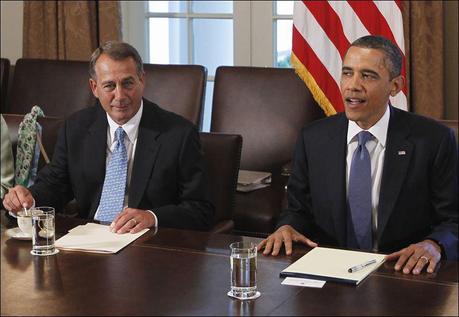
After Months, They Sealed the Deal.
Before I begin, a brief update seems fitting. The radio endeavor has been temporarily sidelined by a bad bout of illness that I am currently experiencing. The silver lining is a little more time for musing, which I will use to catch up on a bit in the coming weeks.Now that the landmark debt ceiling agreement has been signed by President Obama, I feel a need to weigh in. First, I realize this plan has come under fire from progressives, a group with which I sympathize deeply. It's also been bashed by Tea Party members, a group with which I share some (but not many) principles. So, what does this bill do right?
It increases the debt ceiling enough so that this all-consuming debate does not completely resurface for a significant amount of time (until after 2012 elections). This lends some much-needed stability to the circus that is Wall Street. It also frees up the political arena for a discussion of more meaningful issues, like jobs. Congress has been neglecting our stagnating economy and its bleak recovery for months, instead captivated by the spell of these circuitous negotiations. Just how bad is the economy? The unemployment rate is 9.2%. According to the latest report, manufacturing growth fell to its lowest in years. All increases in the GDP since the recession began have been pocketed by the wealthiest in America: the owners. The middle and working classes continue to struggle financially, and the amount of wealth owned by employees is plummeting when expressed as a percentage of the total economy. Meanwhile, the gap between the median household wealth of whites and minorities is expanding. White families own goods and savings that are worth (on average) 18 times the possessions of Hispanic households and 20 times the possessions of black households. That's a disparity that needs to change, and one that is sadly neglected by decision-makers in Washington.
Second, the bill cuts big chunks of fat out of the bloated defense budget. Our military industrial complex spends so much that it dwarfs the defense spending of the next dozen nations combined. The bill could lead to approximately $1 trillion in Pentagon cuts spread over a decade, which represent an annual trimming of 15% from the base budget. The only downside is that many of these cuts are relatively uncertain.
Third, the deficit reduction bill calls for a vote on a Balanced Budget Amendment to the Constitution, which I previously discussed here. This is an important dialogue we need to have as a nation, and I appreciate that this bill brings it to the forefront. Personally, I support such an amendment. However, I think it's irresponsible to enact it now, in the political climate where any tax increases are shouted down and moved off the bargaining table by freshman Republicans. Doing so would probably lead to a painfully austere slate of spending cuts.
Finally, the bill leaves vital safety net programs such as Food Stamps, Medicaid, Social Security, and unemployment benefits intact for the foreseeable future. This is essential not only to fulfill a moral obligation to disabled and low-income Americans, but also to keep the economy afloat. Most of these federal benefits flow directly back to businesses in the form of consumer spending on essentials.
There are certainly flaws in the bill's framework. It should have reformed the tax code to close loopholes and make the very wealthy pay a fair share. It probably weakened the reelection bid of the only viable moderate candidate, Barack Obama. However, it still accomplishes many things. Most importantly, it has set in motion dialogue and a path towards fiscal solvency, things we didn't have before as a nation.

